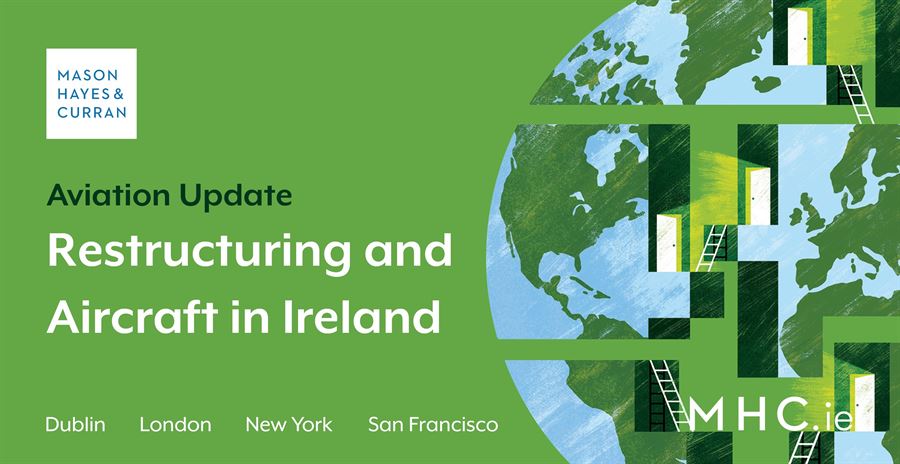
The recent restructuring of the Norwegian Group by the Irish High Court helpfully clarifies the application of the Cape Town Convention in Irish restructuring. It is also an interesting case study regarding the circumstances in which the Irish courts will restructure a group of companies, which is not headquartered in Ireland.
The Norwegian Group's commercial airline activities are organised under parent company Norwegian Air Shuttle ASA (NAS) and its fully owned subsidiaries, Norwegian Air International Ltd, Norwegian Air Norway AS, Norwegian Air Argentina and Norwegian Air UK. The group also has other airline-related subsidiaries in Ireland among a number of other countries.
Restructuring Norwegian
Five companies in the Norwegian Group, each of which had its registered office and centre of main interests in Ireland petitioned the High Court for the appointment of an examiner to them and to their ultimate parent Norwegian Air Shuttle ASA as a related company. The Court appointed an examiner to NAS on the basis that it was a related company. To appoint an examiner to a related company, which is incorporated and carrying on business outside of Ireland, the Court had to be satisfied that:
-
the company had a real prospect of survival;
-
it had a substantial connection to Ireland; and
-
the judgment of the Court would bind the parties to relevant agreements i.e. creditors whose debts had been written down in examinership could not ignore the restructuring and sue for the full debt in another relevant jurisdiction.
Examinership
Examinership is an Irish restructuring process, akin to Chapter 11, albeit quicker and less expensive. It is a court supervised process and creditors cannot sue the company during the examinership process, which lasts for up to 100 days.[1] During the examinership, the examiner is tasked with designing a scheme to restructure the company, which is voted on by the creditors and approved by the Court.
There are two key features of examinership for those involved in aircraft leasing:
-
debts can be written down,but generally only to the value of the security, and
-
contracts can be repudiated, but not modified, unless the parties agree to modify them.
The Cape Town Convention
The Cape Town Convention (the Convention) incorporating the protocol to the Convention on matters specific to aircraft equipment (the Protocol) has the force of law in Ireland.
The Protocol provides for alternate remedies on insolvency. As permitted under the Protocol, Ireland adopted the Alternative A remedies.
The interpretation of the Convention and the Protocol
In the judgment approving the proposed scheme of arrangement,[2] the High Court set out, in very clear terms, a number of the rights and obligations of lessors, lessees and secured parties in relation to aircraft, when an airline operator/lessee is in an examinership.
In overview, the Court clarified that:
-
for the purposes of the Convention, including the Protocol, both the company and the examiner are insolvency administrators;
-
the repudiation of leases is not prohibited by the Protocol and, as an insolvency administrator, the company can bring an application to repudiate leases in examinership;
-
there is nothing in the Cape Town Convention or Protocol to preclude a lessor or holder of security from exercising the self-help remedy of taking possession of the asset; and
-
it would not be appropriate to require the company in examinership to discharge the claims of third party lienholders over aircraft or engines, or to effect physical delivery to a specific location for the benefit of a contract counterparty in priority to all other claims against the company as a condition for permitting the company to repudiate a lease.
We are of the view that it is reasonably clear that, where Alternative A of the Protocol applies, it overrides the automatic stay in Irish law, however the Court was not called on to determine this issue. The parties are entitled to agree to other consensual arrangements for redelivery and return of the aircraft and/or specific rights and entitlements set out in the Convention.
Comment
The clarity provided by the judgments in the Norwegian Case is to be welcomed.
In particular, it is clear that Irish examinership can, in certain circumstances, be used to restructure an airline group provided that one or more group companies is registered in and has its centre of main interests in Ireland. Examinership may be possible on application and interrogation of the particular facts even where the ultimate parent of the group does not have its centre of main interests in Ireland.
However, it is important to note that any third party liens and detention orders are unlikely to be discharged by the company in examinership, before the aircraft is redelivered to the lessor or secured party.
This article is a high level overview. A more technical briefing note on this available here
For more information, contact a member of our Restructuring & Insolvency or Aviation & Asset Finance teams.





